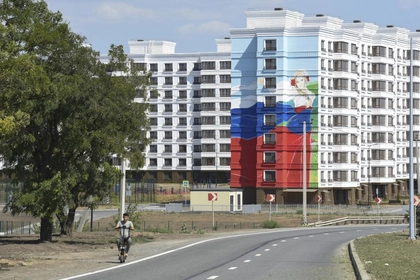In July 2023 the Bundeswehr initiated the KITU 2 (Künstliche Intelligenz für taktische UAS) study, in English the artificial Intelligence (AI) for tactical unmanned aerial vehicle (UAV) study. Three German companies combined to address the requirement: Airbus Defence & Space as prime contractor along with the Munich based drone manufacturer Quantum Systems, and the software developer Spleenlab.
On Tuesday Quantum Systems announced that the consortium had made a “major breakthrough” after it had successfully flown an AI-controlled drone swarm made up of four different types of drone at the Airbus Drone Center in Manching, Bavaria at the beginning of August.
JOIN US ON TELEGRAM
Follow our coverage of the war on the @Kyivpost_official.
The statement said: “For the first time, a specially developed mission-AI controls and coordinates the UAV systems to ensure reliable mission execution even in scenarios with radio interference or a complete failure of individual drones.”
The test was the culmination of the yearlong development of the concept.
The team’s first task was to train the AI using “trial and error deep reinforcement learning” based on Google’s DeepMind, which allowed the system to “refine its tactical processes through continuous self-optimization,” they said.
After a series of tests in a simulated environment, the AI took to the skies in June when Quantum tested a swarm of its own Vector and Scorpion UAVs in flight for the first time. Several different types of mission profile were tested that included reconnaissance and target acquisition tasks integrated with a representative battle management system.

Ukrainian Naivety is Both Good and Bad
The tests were also carried out under simulated difficult operational conditions that included artificially denying the drones access to global navigation satellite systems (GNSS) and imposing radio interference conditions similar to those witnessed on the battlefield in Ukraine.
The August tests served as a customer demonstration and went further than the earlier test. The swarm was made up of a combination of two types of unnamed multi-purpose Airbus drones with the Quantum Systems Vector and Scorpion UAVs.
During the flights, some of which were again carried out under GNSS denial and radio interference conditions, the separate data feeds produced by the drones were merged in real-time to generate a single battlefield picture which was then fed into the Airbus Fortion Joint command and control (C2) battle management system. This integration would allow a single operator to effectively monitor the swarm and make informed operational decisions based on this broader data overview.
Vector also proved capable of autonomous reconnaissance and target acquisition when GPS is jammed – a big problem for Ukraine’s military drones.
Sven Kruck, Quantum Systems’ managing director, said the success of the trials had demonstrated AI’s potential to increase UAV resilience and he anticipated the technology would now rapidly develop and the tactics for their use would very quickly evolve.
“It’s about protecting soldiers and increasing safety,” he said. “In the future, there will be no way around software-based and AI-supported systems for drone technology.”
While the consortium’s KITU2 research results from the study are intended to be incorporated into major Bundeswehr projects such as the Main Ground Combat System (MGCS) and the Future Combat Air System (FCAS), the trials could soon be available for use by Ukraine.
Quantum Systems has supplied almost 300 of its drones to the Armed Forces of Ukraine with more than 150 more due for delivery this year. In addition, it opened an assembly plant in Ukraine in April. Currently kits are dispatched from Germany for assembly in the facility with medium term plans to source components through local manufacturers. The company says the aim is to eventually boost UAV production capacity to 1,000 units per year.
Although there has been no official mention of fusing these drones with the AI control systems currently being developed it is likely to happen in the near future which would represent yet another game changer in the drone war on Ukraine’s front lines.
You can also highlight the text and press Ctrl + Enter






